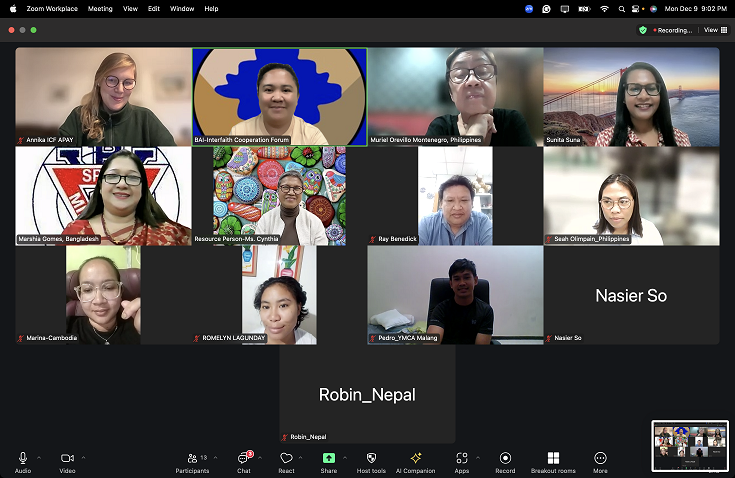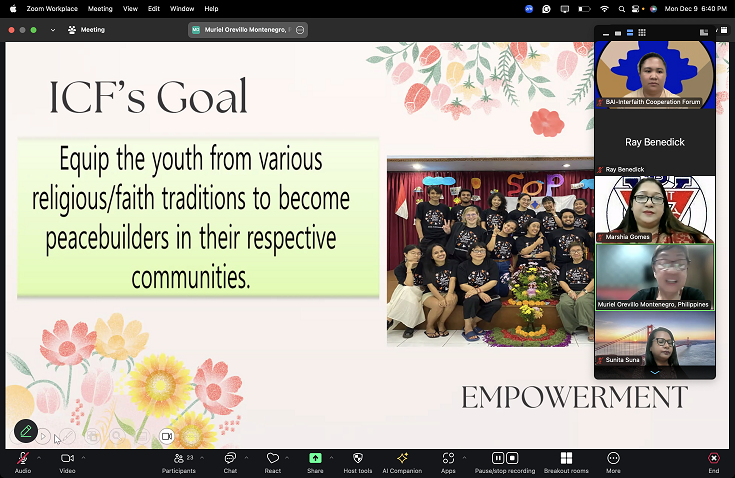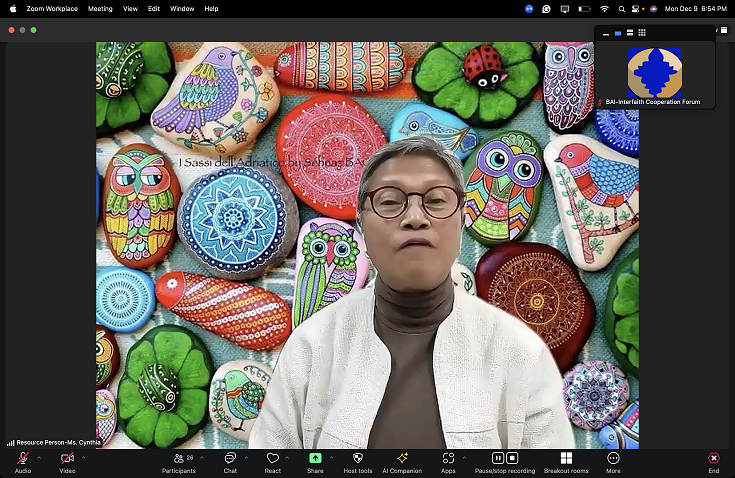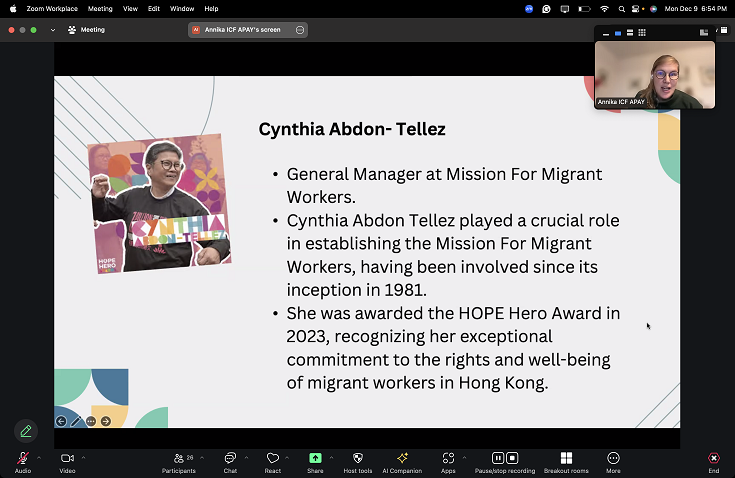Webinar on "Women Migrant Workers: Their Vulnerability to Gender-Based Violence"
Last Updated (Wednesday, 18 December 2024 17:25)
ICF held a webinar on "Women Migrant Workers: Their Vulnerability to Gender-Based Violence," which was part of the collaboration between ICF and the Asia and Pacific Alliance of YMCAs' Gender Equity Committee concerning the 16 Days of Activism Against Gender-Based Violence. The event brought together 25 participants from diverse faith communities across Asia, with 12 men and 13 women. The event focused on raising awareness about the challenges faced by women migrant workers, particularly their vulnerability to gender-based violence.

The program opened with a prayer led by Psyche Mankhin from Bangladesh. Ms. Baidido Saganding, ICF Program Officer, served as the moderator of the activity. Their words set a reflective tone for the day. Afterward, Ms. Sunita Suna, APAY Executive Secretary for Programs, welcomed the guests and participants. In her opening message, she highlighted the strength of unity in addressing global challenges like gender-based violence. She emphasized our shared responsibility to build a safer and more inclusive world.
Ms. Marshia Mili Gomes, President of Bangladesh YMCA and Chairperson of the APAY Gender Equity Committee, shared a message emphasizing the importance of gender equality and protecting the rights of migrant workers, particularly women. Given women's ongoing challenges, she reflected on how timely and relevant the discussion was. Her message also called for unity and peacebuilding, underscoring the need to work together for a meaningful change.
The ICF Coordinator, Dr. Muriel Orevillo-Montenegro, presented the advocacy initiatives of the Interfaith Cooperation Forum (ICF). She pointed out that the webinar is in time for the 76th anniversary of the UN Declaration of Human Rights and that it is timely to talk about women migrant workers' rights. She explained how its initiatives focus on empowering young people with training to take action. Dr. Montenegro stressed the various programs of ICF and its efforts to empower young people with the knowledge, values formation, and skills to lead towards transformative change. She outlined ICF's programs, including the thematic workshops, School of Peace (SoPs), training of trainers (ToT) sessions, and support to the ICF alums' activities through small grants.

Ms. Annika Denkmann introduced the webinar's keynote speaker, Ms. Cynthia Abdon-Tellez, General Manager at Mission for Migrant Workers in Hong Kong. Ms Abdon-Tellez's presentation focused on the vulnerabilities faced by women migrant workers, providing insights into the systemic challenges and offering practical solutions to mitigate risks. Ms. Abdon-Tellez discussed many issues women migrant workers face, such as abuse, illegal termination of contracts, illegal recruitment, and high agency fees, among others. She cited cases of abuse women migrant workers experienced and how they assisted them in getting justice, highlighting the case of Erwiana Sulistyaningsih from Indonesia. She helps the participants see the realities of exploitation, abuse, and the lack of protection faced by women migrant workers.
 |  |
Ms. Abdon-Tellez emphasized that women migrant workers are particularly at risk of gender-based violence due to several factors such as isolation, lack of legal protections, and dependence on their employers. Many of these women migrant workers work in the confines of private households as domestic helpers or in factories, where they experience physical, emotional, and sexual abuse. She pointed to the hidden nature of this violence, as many women are afraid of speaking out due to threats of deportation, loss of income, or even physical harm.
Furthermore, Ms. Abdon-Tellez discussed how migration can make these women even more vulnerable, as they often lack a strong support system in their host countries. She also emphasized the importance of advocacy in raising people's awareness of the predicament of migrant workers and creating more opportunities for solidarity and collective action. She added that systemic issues like poverty, gender inequality, and limited access to resources compound the vulnerabilities of migrant women. She also emphasized the importance of providing migrant workers with access to legal support, healthcare, and safe spaces where they can report abuse without fear of retaliation. She also stressed the importance of international collaboration in addressing the root causes of migration, including economic disparity and gender discrimination in home countries.
After the discussion with the resource speaker, participants engaged in dynamic breakout room discussions where they shared experiences, strategies, and ideas on the rights and safety of women migrant workers. These collaborative dialogues enriched the session, fostering deeper understanding and actionable outcomes.
The webinar concluded with a synthesis by Hamsiya Olimpain, who reflected on the key insights and discussions of the day.
By Hamsiya Olimpain
ICF Alumna and alternate member, ICF Program Committee
Philippines





